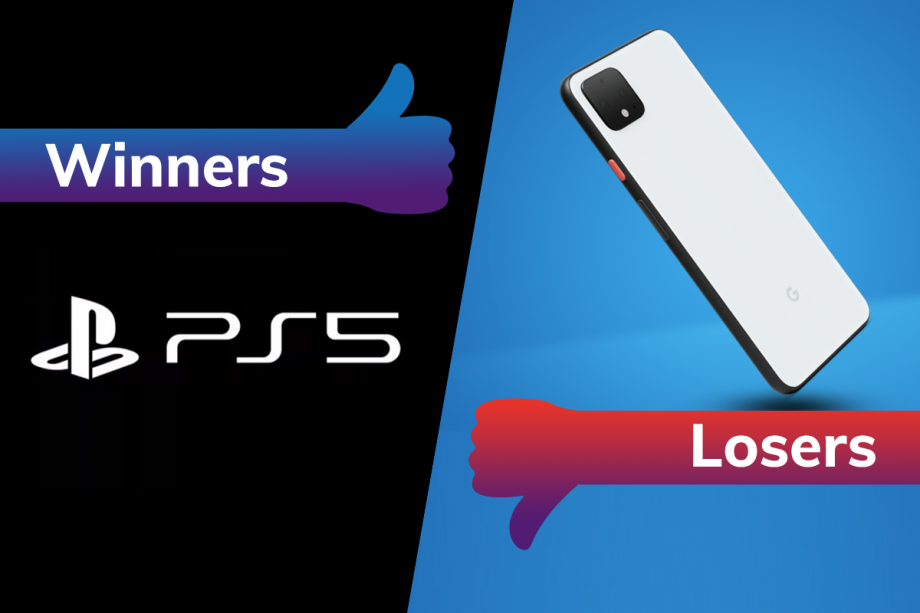Winners & Losers: PS5 footage wows gamers while the Pixel 4 takes a beating

Despite the on-going coronavirus lockdown, it’s been a reasonably eventful week in tech. From Twitter telling staff to work from home “forever”, to Trump renewing his feud with Huawei, and gamers finally getting to see PS5 gameplay footage. While the big winners were definitely PlayStation fans, thanks to that glimpse at the upcoming hardware, this weeks loser was the Google Pixel 4, which came under heavy critical fire.
Winner: PS5 fans
The good news for PlayStation fans was two-fold this week. Not only did they get to see shiny new gameplay footage, (albeit of a demo for the Unreal Engine 5, rather than a real upcoming game,) they also got confirmation that the PlayStation 5 will not see its release postponed by the coronavirus. Phew.
The visuals on display in the Unreal Engine 5 demo – which was recorded directly from a PS5 developer kit – were jaw-dropping. It showed off the engine and the console’s ability to display dynamic light and how that could change environments within a game.
This demo came hot on the heels of the much-discussed Xbox Series X gameplay reveal. That live stream event was derided for not really showing off gameplay. Instead, viewers saw in-game cinematics and elements of in-engine footage, but nothing that could really be described as gameplay. As a result, it was the less-hyped PS5 gameplay reveal that hit harder with fans. Take a look at it below.
The positives didn’t stop there for Sony and PlayStation though – when the stream finished, Epic Games founder and CEO, Tim Sweeney, started piling praise on the upcoming console.
“Sony’s storage system is absolutely world-class,” said Sweeney. “Not only the best-in-class on console but also the best on any platform. Better than high-end PCs. I think it’s going to enable the types of immersion that we could only have dreamed of in the past. The days of pop-in, geometry pop-in as you’re going through game environments, are ended.”
In the constant back and forth that’s going on between Microsoft and Sony, in the build-up to next-gen console releases, it was Sony’s week. We can’t wait to see more from both machines.
Loser: Google Pixel 4
Google’s smartphone has taken a lot of flak this week and rightly so. Shockingly a recent report in The Information revealed that Google had been made aware of the Pixel 4’s sub-standard battery life long before the phone was released. The company chose to ignore the feedback and shipped the phone as it was.
As we know, the Pixel 4 turned out to be a disappointment, but now it seems like something could actually have been done about it – bad form Google.
Rick Osterloh, the former president of Motorola, gave the phone a real pasting in a meeting prior to the phone’s release, according to the report. One excerpt reads:
“At a hardware team all-hands meeting in the fall, ahead of the October launch in New York, Osterloh informed staff about his own misgivings… He told them he did not agree with some of the decisions made about the phone, according to two people who were present at the meeting. In particular, he was disappointed in its battery power.”
Why, oh why didn’t Google do anything about it? We can’t figure it out.
As if that reputation-chewing revelation wasn’t enough, Google received another blow this week when it was announced that camera guru, Marc Levoy, had left the company.
The Pixel 4’s camera was its biggest selling point, by a long way, so to lose the man who masterminded that camera isn’t likely to help Google’s struggling smartphone business.
The tech behemoth went from producing a very good phone in the Pixel 3, (four and a half stars in our review,) to producing one known for its bad battery life. While the Pixel 4 sold in surprising volume, it remains the case that Google is making a loss on its smartphone business. Reversing that is looking more and more difficult.


